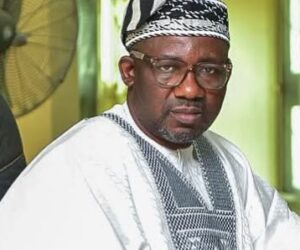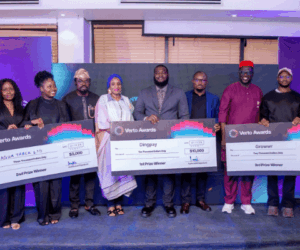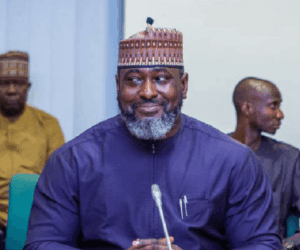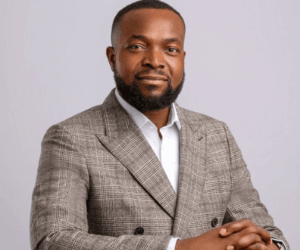…Experts call for investment in AI infrastructure, talent
As the global Artificial Intelligence (AI) economy surges toward an estimated $15.7 trillion by 2030, Nigeria risks being left behind unless it urgently addresses its deepening digital divide, industry leaders and experts warned.
With over 60 million Nigerians – more than the combined populations of Ghana and Rwanda – still offline, the country faces a critical challenge in securing its place in the transformative AI revolution.
Stakeholders have called for massive investments in digital infrastructure, talent development, and ethical frameworks to ensure Nigeria can harness AI’s potential to drive economic growth and solve pressing social challenges.
The BusinessDay-organised summit, themed: ‘Shaping Nigeria’s AI Future: Collaborations, Capacity, and Accountability,’ convened leaders from government, academia, business, and civil society to tackle the barriers preventing Nigeria from fully participating in the global AI economy.
Frank Aigbogun, publisher of BusinessDay, set the tone with a sobering assessment of Nigeria’s digital exclusion crisis.
“Artificial intelligence is not just the future; it is already here. Yet, over 60 million Nigerians remain offline, cut off from the digital tools that drive education, healthcare, commerce, and opportunity. This is a dangerous gap that could cost us our share of the $15.7 trillion global AI windfall projected by 2030,” Aigbogun said.
Read also: Artificial Intelligence is a contradiction in terms
While AI could add an estimated $15.7 trillion to the global economy by 2030, according to a PwC report, BusinessDay publisher affirmed that Africa’s share of the pie remains dangerously small.
He noted that digital exclusion already costs African economies over $100 billion annually, with less than 40 percent of rural Nigeria enjoying reliable internet.
“This summit is our response. It is a declaration that digital exclusion is unacceptable. Access to technology must not be a privilege, it is a right. Every Nigerian has a right to progress and a right to participate fully in the global digital economy,” he added.
Ladi Asuni, partner, Technology Platforms at KPMG, reinforced the urgency of combining innovation with governance and inclusion. “AI is no longer abstract; it is embedded in our daily lives. But what happens when innovation scales without inclusion, or without guardrails of governance and trust? The risk is clear: we build powerful systems that leave behind the very people they are meant to serve,” Asuni said.
He highlighted the impact of AI in financial services, including fraud prevention, credit assessment, and customer service, where AI-driven tools are expanding access. However, he cautioned that without policies to ensure fairness and transparency, AI could reproduce or even amplify existing social inequalities.
“As AI grows, so do concerns around fairness, transparency, and intellectual property. Large language models are trained on vast amounts of data, often without the explicit consent of publishers or authors. Who protects intellectual rights? Who ensures fairness when algorithms trained on Western data are applied to Nigerian realities?” Asuni asked.
The summit’s panel session on ‘AI Governance, Innovation, and Inclusive Partnerships,’ brought together voices from technology, law, and policy, including Charles Emembolu of TechQuest STEM Academy; Justina Oha of Digital Equity Africa; Elizabeth Ayeni of Olaniwun Ajayi LP; Emaediong Lawrence of Wigwe & Partners, and Tumi Akinade of KPMG West Africa. Moderated by BusinessDay’s Bethel Olujobi, the discussion zeroed in on Nigeria’s readiness or lack thereof for the AI era.
Charles Emembolu, founder of TechQuest STEM Academy, underscored the sovereignty risks of relying solely on foreign AI systems. “We cannot just consume global technology. We must invest money, not just policies, in AI development. If Nigeria wants to leapfrog, then government, private sector, and development partners must act urgently,” he said.
For Emembolu, Nigeria’s path to becoming an active player in the global AI economy hinges on deliberate investment and mindset change.
Read also: Artificial Intelligence in treasury: From automation to strategic transformation
Justina Oha, executive director of Digital Equity Africa, emphasised the urgent need to address Nigeria’s deep digital divide, describing her experience running AI boot camps for children aged 6–17, noting their eagerness and capacity to learn.
“You cannot talk about an AI-driven economy when young people in rural areas cannot even afford smartphones or data. Millions of Nigerians don’t have devices, and those who do struggle with expensive data. Inclusion must be reflected in the affordability of devices and connectivity. Telcos remain expensive, and we must innovate alternative models of connectivity,” Oha stated.
Elizabeth Ayeni, associate at Olaniwun Ajayi LP, raised concerns about data availability and regulation. While Nigeria passed the Data Protection Act (NDPA) in 2023, she noted that the country still lacks a comprehensive AI law.
“Our data is fragmented, outdated, and often unstructured. Without high-quality, accessible datasets, AI systems cannot deliver locally relevant solutions. More importantly, we need to protect citizens so Nigeria does not simply become a raw material source for global AI companies,” Ayeni said.
Emaediong Lawrence, associate at Wigwe & Partners, highlighted the importance of equipping Nigerians with the right AI skills, while underscoring the government’s role in leading national data collation. “Our data is fragmented. The government must take the first step, since it already has access to public data. Frameworks should then allow both public and private sectors to feed into a central data pool. The Nigeria Data Protection Act (NDPA) is a strong starting point, but we must protect our data to avoid selling our future, and that’s how we transition from consumers to producers of AI solutions,” Lawrence stated.
Tumi Akinade, associate director of tech platforms at KPMG West Africa, pointed to Nigeria’s weak digital infrastructure as a major bottleneck, adding, “AI cannot scale without the right backbone. From data centres to broadband penetration, we need to invest massively in the infrastructure that will power AI applications across sectors.”
Yetunde Anibaba, a senior lecturer at Lagos Business School, highlighted AI’s potential to address Nigeria’s social deficits during a fireside chat. With 18.2 million out-of-school children—roughly half the global total—Nigeria faces an education crisis that AI could help mitigate through personalised learning and language translation tools. In healthcare, where one doctor serves an estimated 6,000 people, diagnostic AI and virtual consultations could extend access to underserved communities. “If we fix education and health, we fix most of our social problems,” Anibaba said. “A healthy, educated person can create solutions for themselves and others.”
However, Anibaba cautioned that AI’s benefits come with risks, including misinformation, bias, and job displacement. She advocated for ‘anticipatory governance’ to prepare for long-term risks while fostering innovation.
The media’s role in Nigeria’s AI journey was also a key discussion point. Fuad Lawal, editor-in-chief of Techcabal, argued that AI can supercharge journalism by automating repetitive tasks like search engine optimisation, freeing journalists for deeper investigative work.
David Ajikobi of Africa Check called for a shift from debunking misinformation to ‘pre-bunking’ by educating audiences proactively, noting that media literacy in AI is critical to combating misinformation.









